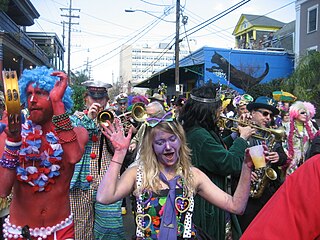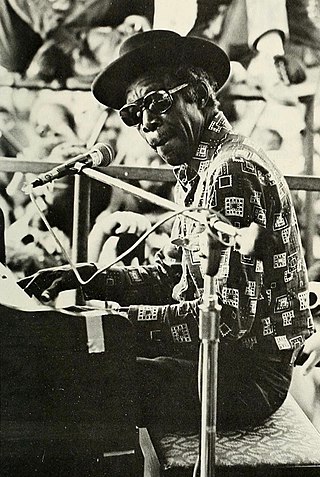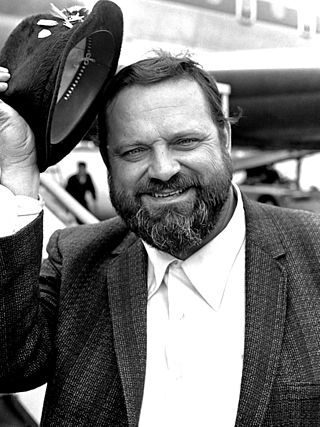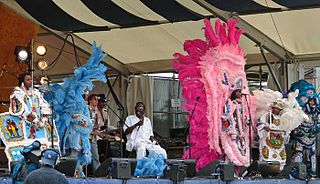
Mardi Gras is the final day of Carnival ; it thus falls on the day before the beginning of Lent on Ash Wednesday. Mardi Gras is French for "Fat Tuesday", reflecting the practice of the last night of consuming rich, fatty foods in preparation for the Christian fasting season of Lent, during which the consumption of such foods is avoided.

Henry Roeland "Roy" Byrd, better known as Professor Longhair or "Fess" for short, was an American singer and pianist who performed New Orleans blues. He was active in two distinct periods, first in the heyday of early rhythm and blues and later in the resurgence of interest in traditional jazz after the founding of the New Orleans Jazz and Heritage Festival in 1970. His piano style has been described as "instantly recognizable, combining rumba, mambo, and calypso".

The Rex Organization, commonly referred to simply as Rex, is a New Orleans Carnival krewe which stages one of the city's most celebrated parades on Mardi Gras Day. Rex is Latin for 'king', and Rex reigns as "The King of Carnival".

Alois Maxwell "Al" Hirt was an American trumpeter and bandleader. He is best remembered for his million-selling recordings of "Java" and the accompanying album Honey in the Horn (1963), and for the theme music to The Green Hornet. His nicknames included "Jumbo" and "The Round Mound of Sound". Colin Escott, an author of musician biographies, wrote that RCA Victor, for which Hirt had recorded most of his best-selling recordings and for which he had spent most of his professional recording career, had simply dubbed him "The King." Hirt was inducted into The Louisiana Music Hall of Fame in November 2009. He received eight Grammy nominations during his lifetime, including winning the Grammy award in 1964 for his version of "Java".

The holiday of Mardi Gras is celebrated in southern Louisiana, including the city of New Orleans. Celebrations are concentrated for about two weeks before and through Shrove Tuesday, the day before Ash Wednesday. Mardi Gras is French for Fat Tuesday, the season is known as Carnival and begins on 12th Night, January 6th, and extends until midnight before Ash Wednesday. Club, or Krewe, balls start soon after, though most are extremely private, with their Kings and Queens coming from wealthy old families and their courts consisting of the season's debutantes. Most of the high society Krewes do not stage parades. As Fat Tuesday gets nearer, the parades start in earnest. Usually there is one major parade each day ; many days have several large parades. The largest and most elaborate parades take place the last five days of the Mardi Gras season. In the final week, many events occur throughout New Orleans and surrounding communities, including parades and balls.

Mardi Gras Indians are African American carnival revelers in New Orleans, Louisiana, who dress up for Mardi Gras in suits influenced by the cultural practices of Native Americans, West Africans, and Afro-Caribbeans. The music, dance, and regalia from these cultures created the Mardi Gras Indian tradition during the era of slavery in Louisiana that continues today. This cultural tradition is a part of the African and African diaspora decorative aesthetic, and is an African-American art form. Black masking Indians are a subculture in New Orleans.
Krewe of Tucks is a New Orleans Mardi Gras krewe.

The Dirty Dozen Brass Band is an American brass band based in New Orleans, Louisiana. The ensemble was established in 1977, by Benny Jones and members of the Tornado Brass Band. The Dirty Dozen incorporated funk and bebop into the traditional New Orleans jazz style, and has since been a major influence on local music. They won the Grammy Award for Best American Roots Performance in 2023.

The Wild Tchoupitoulas is a 1976 album by the New Orleans Mardi Gras Indian tribe the Wild Tchoupitoulas. While not a commercial success, the effort was well received critically and the experience recording it encouraged the four Neville brothers to perform together for the first time as a group.
Huey Pierce "Piano" Smith was an American R&B pianist and session musician whose sound was influential in the development of rock and roll.
Mardi Gras refers to events of the Carnival celebrations, beginning on or after Epiphany, and culminating on the day before Ash Wednesday.

"Big Chief" Monk Boudreaux is an African-American musician and Big Chief of the Golden Eagles, a Mardi Gras Indian tribe. He is widely known for his long-time collaboration with Big Chief Bo Dollis in The Wild Magnolias.

"Mardi Gras Mambo" is a Mardi Gras-themed song written by Frankie Adams and Lou Welsch. The song's best known version was recorded in 1954 by the Hawketts, whose membership included Art Neville, a founding member of the Meters and the Neville Brothers. It is one of the iconic songs frequently played during the New Orleans Mardi Gras.

The Wild Magnolias are a Mardi Gras Indian tribe who also record and play as a funk musical act from New Orleans, Louisiana.

Al "Carnival Time" Johnson is an American singer and piano player best known for the Mardi Gras song "Carnival Time".

Mardi Gras in the United States is celebrated in a number of cities and regions in the country. Most of these places trace their Mardi Gras celebrations to French, Spanish, and other Catholic colonial influences on the settlements over their history.
"Carnival Time" is a New Orleans Mardi Gras-themed R&B song that was performed by Al Johnson and recorded in 1960. The song's composition was originally credited to Al Johnson and Joe Ruffino, though Johnson now holds exclusive rights. It is now considered an iconic festive song of the New Orleans Carnival season.
"Go to the Mardi Gras" or "Mardi Gras in New Orleans" is a New Orleans Mardi Gras-themed R&B song that was performed by Professor Longhair and recorded several times since 1949. He co-wrote the song with Theresa Terry. The song was covered by Fats Domino and released as a single in 1953. It is now considered an iconic festive song of the New Orleans Carnival season.
Cha Wa is a Grammy-nominated Mardi Gras Indian funk band based out of New Orleans, Louisiana. The name Cha Wa is a slang phrase used by Mardi Gras Indian tribes, meaning "we're comin' for ya" or "here we come." Frontman Honey Bannister is known for dressing in traditional Mardi Gras Indian clothing during performances, including intricately designed headdresses.

Senator Nolan Jones was an American record company owner, producer, singer, and songwriter who worked in R&B and blues. He recorded and promoted Louisiana and Mississippi performers and songs for more than four decades.













